Land Use
Korea has now become ever friendlier toward businesses by streamlining procedures required in the development of industrial complexes and cities. Unreasonable regulations that had limited business activities also have been drastically eased or repealed.
- Streamlined procedure of industrial complex development
- Business investment can be made promptly as necessary thanks to the simplified procedure required in the development of an industrial complex. The process will now only take less than six months compared to almost three years in the past. Moreover, local governments can now designate all scales of industrial complexes with autonomy. Approval by the Minister of Land, Transport, and Maritime Affairs was mandatory for a large-scale local industrial complex in the past.
We also came up with a reasonable ratio of green area within the complex. This was to strike a balance between ensuring better working environment for employees and securing sites necessary for business activities.
- Creation of industrial complexes for long-term lease
 We are planning to expand industrial sites available for long-term lease at an affordable rate to promote investment from small- and medium- sized enterprises. 33 million ㎡ of these sites will be provided between 2008 to 2017. Currently, the lease costs around three percent of the annual cost used in building the complex and the lease contract can be made up to 50 years. Businesses can now focus on productive activities free from worrying about securing land since they can stably use the site at a competitive price during the contract. We are planning to expand industrial sites available for long-term lease at an affordable rate to promote investment from small- and medium- sized enterprises. 33 million ㎡ of these sites will be provided between 2008 to 2017. Currently, the lease costs around three percent of the annual cost used in building the complex and the lease contract can be made up to 50 years. Businesses can now focus on productive activities free from worrying about securing land since they can stably use the site at a competitive price during the contract.
- Deregulation in the Metropolitan area
 Construction or expansion of a factory is now possible in any size or industry even in the capital area if it is inside an industrial complex. Large-scale theme parks, resorts, and shopping centers such as department stores can be built as longs as they observe the cap on water pollution load even inside areas that had development restrictions for environmental preservation. Moreover, congestion charges will be exempt on buildings for financial service purposes within a financial district and R&D facilities within an industrial complex. As a result, business will be able to reduce their initial investment. Construction or expansion of a factory is now possible in any size or industry even in the capital area if it is inside an industrial complex. Large-scale theme parks, resorts, and shopping centers such as department stores can be built as longs as they observe the cap on water pollution load even inside areas that had development restrictions for environmental preservation. Moreover, congestion charges will be exempt on buildings for financial service purposes within a financial district and R&D facilities within an industrial complex. As a result, business will be able to reduce their initial investment.
- Eased business regulation on Free Economic Zones (FEZs)
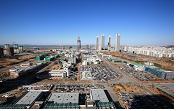 Industrial complexes can be built within FEZs inside Incheon and Pyongtaek from 2009 since the regulation on constructing industrial complexes in the capital area is abolished. Industrial complexes can be built within FEZs inside Incheon and Pyongtaek from 2009 since the regulation on constructing industrial complexes in the capital area is abolished.
- Additional removal of Restricted Development Zones with less value for preservation
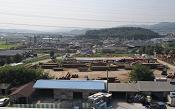 About 3,980 ㎢ around large cities including Seoul and Busan had been designated as Restricted Development Zones (RDZs). Construction and other development activities are banned in RDZs to prevent reckless urban sprawl. Although the designation has benefits, it also hinders the growth of cities due to lack of usable land. About 3,980 ㎢ around large cities including Seoul and Busan had been designated as Restricted Development Zones (RDZs). Construction and other development activities are banned in RDZs to prevent reckless urban sprawl. Although the designation has benefits, it also hinders the growth of cities due to lack of usable land.
Therefore, the government has set up the Plan to Realign and Manage RDZs to lift controls on around 188 ㎢ in September 2008. The land will be utilized mainly as industrial and residential complexes.
As a result, large local cities such as Busan and Ulsan will reap the benefits of promoting the local economy by creating large-scale industrial complexes. Moreover, the capital area can expect improved residential welfare of its citizens by providing massive numbers of houses in the suburbs.
- Expanded provision of development sites
- The insufficiency of land available for development has been a problem for years. So, we amended the once-uniform regulations on protecting farmlands, forest lands, and military facilities to make them more reasonable. The designation of Agriculture Promotion Areas with relatively low agricultural production has also been lifted. Reserve forest lands with less value have become semi-reserve forest lands. Moreover, we lifted or eased regulations on protecting military facilities as long as it does not interrupt military operations.
In total, regulations on more than two thousand ㎢ have been alleviated or repealed, expanding land ready for development. This will help businesses that have found trouble in securing factory sites and land.
- Simplified procedures of urban development
- The basic plan that showed long-term development directions for each city has become a concrete strategy. It is now flexible so as not to limit other development projects. The central government has devolved the authority to approve urban planning projects to local governments. Therefore, local governments can now plan for the development of their cities with autonomy and accountability.
They can now flexibly and swiftly respond to demands for development in their respective cities. In addition, this will shorten the time required to make changes in urban development plans by more than a year, giving a boost to businesses’ development projects.
- Cost reduction in factory construction
- The land to factory size ratio will be revised upward for factories within semi-industrial, agricultural, and factory complexes. We will also correct the ratio of green areas and roads a single factory must include to a reasonable level. Then, businesses will experience cost reduction in securing land. Moreover, we will levy the infrastructure charge to development projects above a certain scale only to businesses within an area in desperate need for infrastructure. It had been imposed uniformly to all projects before. This will also cut business cost.
Logistics & Transport Network Linking The Globe
Korea is your best logistics partner for your global business. Bridging 5 oceans and 6 continents, Korea’s global logistics with the efficient IT-based logistics system has been providing great incentives to your investment.
- Full Preparation of International Trade Ports such as Busan and Gwangyang Ports and Wide Hinterland Logistics Complex
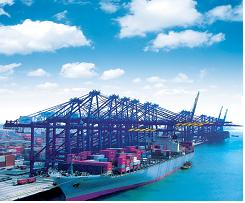 Korea has the global shipping and port network linking everywhere in the world including Busan Port with the world’s 5th largest cargo volume, Gwangyang port, Incheon port, and Pyeongtaek Dangjin port. In addition, it has secured wide hinterland logistics complex in order to perform related value-added activities. Busan New port, opened in 2006, has been selected as a preferred port of call by such large shipping companies as Maersk and Zim. Furthermore, many foreign-invested companies have moved to the hinterland logistics complex in Busan New port. . Korea has the global shipping and port network linking everywhere in the world including Busan Port with the world’s 5th largest cargo volume, Gwangyang port, Incheon port, and Pyeongtaek Dangjin port. In addition, it has secured wide hinterland logistics complex in order to perform related value-added activities. Busan New port, opened in 2006, has been selected as a preferred port of call by such large shipping companies as Maersk and Zim. Furthermore, many foreign-invested companies have moved to the hinterland logistics complex in Busan New port. .
Foreign investors residing in the hinterland logistics complex can benefit from lower rental fee than that of Japan, China, Hong Kong and Singapore. Moreover, the Korean Government offers exceptional treatment by providing a 100% exemption of the Corporate Tax and Income Tax for three years, another 50% exemption for the succeeding two years, and 100% exemption of Regional Tax (Acquisition Tax, Registration Tax) for 7 to 15 years.
In addition, not only logistics company but also manufacturing company can reside in the hinterland logistics complex and enjoy the same advantages from the year 2008.
- Best services at Incheon Airport, the Gateway to Asia
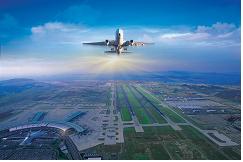 Incheon Airport, opened in 2001, currently services 71 airlines flying to 169 major cities and ranks the world’s second airport in cargo transports. With completion and grand opening of the second stage project, the airport’s cargo handling capacity has been doubled to 4.5 million tons per year. Incheon Airport, opened in 2001, currently services 71 airlines flying to 169 major cities and ranks the world’s second airport in cargo transports. With completion and grand opening of the second stage project, the airport’s cargo handling capacity has been doubled to 4.5 million tons per year.
In March 2008, Incheon Airport received the honor of being named the world’s best cargo airport by Air Cargo World and took first place for 3 consecutive years in the Airport Council International (ACI)’s Best Airport Worldwide Quality Survey. Global companies like ASML and SONY have already have chosen Incheon Airport as their global logistics hubs. Beginning 2008, Incheon Airport is providing the very best services at the lowest airport user charge rates (e.g. landing and land use charges) in Northeast Asia.
| |
Pudong |
Hong Kong |
Narita |
Kansai |
Incheon |
| Landing Charge |
\4,548,008 |
\3,463,182 |
\8,239,838 |
\9,024,585 |
\3,111,000 |
| Parking Charge |
\681,992 |
\669,178 |
\784,747 |
\784,747 |
\374,000 |
※ Above charges are for a B747-400 aircraft with maximum take-off weight 395 tons parking for 8 hours (based on foreign exchange rates of 30 June 2008).
- Starting Point to the Iron Silk Road Linking Eurasia
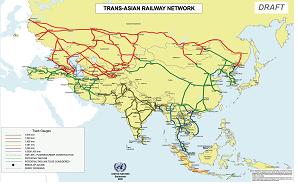 Busan-Dorasan Line in Korea has been selected as a major line in the Trans Asian Railway (TAR), which links 28 Asia-Pacific countries with the total length of 80,000 km. Such selection has enabled it to serve as a starting point of TAR in East Asia. Busan-Dorasan Line in Korea has been selected as a major line in the Trans Asian Railway (TAR), which links 28 Asia-Pacific countries with the total length of 80,000 km. Such selection has enabled it to serve as a starting point of TAR in East Asia.
Furthermore, Korea has equipped the railway networks linking to Trans-Siberia Railway (TSR) through Busan-Vostochny route and to Trans-China Railway (TCR) through Busan-Lianyungang route.
- Efficient Hub&Spoke Logistics System and Convenient Transport Network
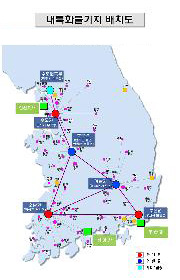 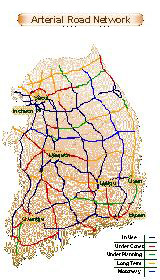 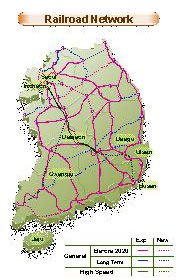
- Korea provides state-of-the-art logistics services including RFID-based Location Tracking, Gate Automation by establishing advanced Integrated Freight Terminals (ITFs) in the nation’s 5 major areas. In addition, it has streamlined the procedure required for a business to obtain the approval and permission for the logistics complex development and reduced the lead time from two year to six months. Furthermore, the Korean Government provides sharp cuts in a variety of taxes including development charge, real-estate acquisition tax and registration tax.
In terms of transport, the Korean Government provides the road transport service through its national highways and expressways network with 7 North-South lines, 9 East-West lines linking, which enables the prompt linking among import and export airports and ports, and inland container depots (ICDs) around the nation.
In addition, nation-wide major logistics bases and large cities are connected by the railroad network with 6 North-South and 6 East-West lines. Such railroad network provides more efficient mass transport service among different logistics bases.
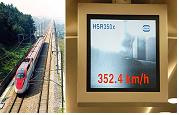 In particular, Korea opened the world’s 5th High-speed Railway between Seoul and Busan, and has successfully operated the service with the average speed of over 300km/h. Additionally, Honam High-speed Railway service is scheduled to begin in 2011 between Seoul and Mokpo. In particular, Korea opened the world’s 5th High-speed Railway between Seoul and Busan, and has successfully operated the service with the average speed of over 300km/h. Additionally, Honam High-speed Railway service is scheduled to begin in 2011 between Seoul and Mokpo.
Contact Points in Korea : Logistics Policy Division, Ministry of Land, Transport and Maritime Affairs www.mltm.go.kr
Entry & Departure
- Facilitated entry/departure procedures for foreign investors
- Executive managers of foreign companies with investments of minimum $5 million in the manufacturing industry or $10 million in the tourism industry in Korea and employees of foreign economic organizations based in Korea are issued Investor Express Cards beginning 29 August 2008 to facilitate their entry/departure procedures. Investor Express Card holders may use express windows cutting entry/departure processing time from 10-20 minutes to 2-3 minutes. Card holders are also given free-of-charge access to Incheon Airport’s CIP (Commercial Important Person) Lounge that is equipped with computers, office equipment, and meeting facilities that enables them to take care of their business or have meetings at the airport.
Foreign Investment Procedure and Incentive
- Providing favorable living environment for foreign investors and investing companies
- The Government of Korea has decided to establish the Exclusive Foreign Residence Area at the places where foreign investments are expected, and to provide all the housing constructed in such Areas to foreigners only. Furthermore, the Government now enables a foreign investing company to acquire housing and rent to its employees. Such move will resolve the inconvenient housing, one of the major concerns of foreign investors, thus inviting further foreign investments with better business environment.
Contact Points in Korea : Housing Market System Division, Ministry of Land, Transport and Maritime Affairs,
www.mltm.go.kr, E-mail : khk3707@korea.kr

|